- Part 1: The Four Institutional Pillars: Strategic Vision in Turbulent Times;
- Part 2: Aspiration into action - Together creating the future;
- Part 3: BIDV Party Committee: Actions to create and drive development;
***
Part 1: The Four Institutional Pillars: Strategic Vision in Turbulent Times
In the context of a volatile world with declining global growth, fierce strategic competition between major powers, regional conflicts and increasingly fierce climate change, in Vietnam, the cause of innovation and international integration is entering a new phase with many opportunities but also posing many challenges. To proactively seize opportunities, overcome challenges and realize the aspiration to develop the country by 2045, the Politburo has issued four important resolutions - No. 57-NQ/TW (December 22, 2024), 59-NQ/TW (January 24, 2025), 66-NQ/TW (April 30, 2025) and 68-NQ/TW (May 4, 2025) - identified as the "four strategic pillars", laying a solid institutional foundation for the nation's new progress.
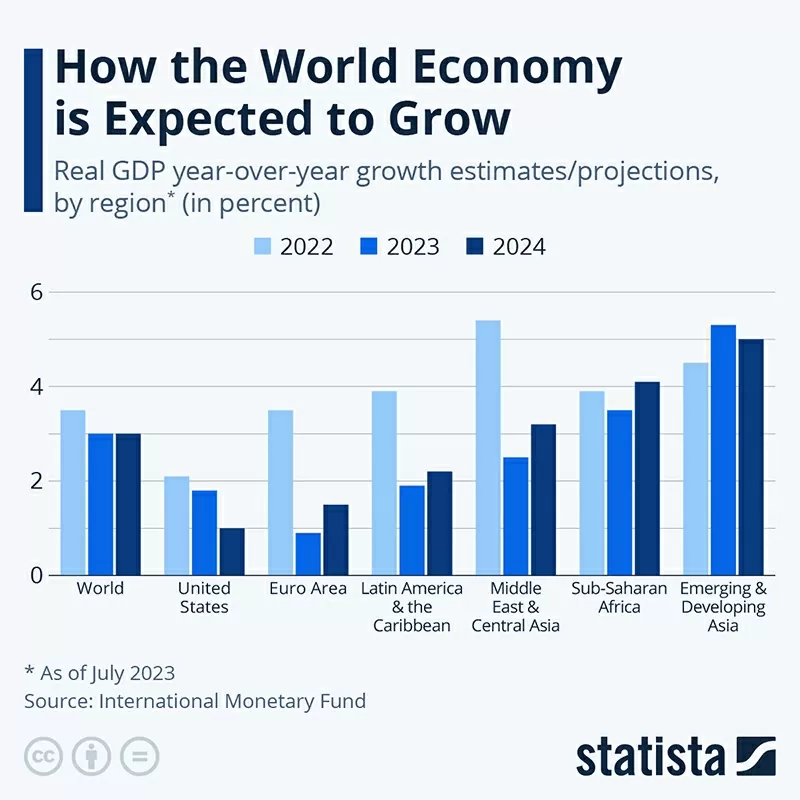 |
| Global GDP growth chart (2022–2024). (Internet source) |
The world in a whirlpool of change
In 2024-2025, the world economy continues to face many uncertainties, with growth slowing down significantly. According to the World Bank (Global Economic Prospects, June 2024), global GDP growth is forecast at 2.6% in 2024; the IMF (WEO Update, July 2024) maintains a forecast of around 3.2%. These signals show that the economy is growing slowly and is vulnerable to unpredictable changes in the world.
In terms of politics and security, strategic competition between major countries continues to develop in a complex manner. Relations between major power centers such as the US and China still contain many uncertainties, not only in the fields of economics, trade and technology, but also in areas such as the East Sea and the Taiwan Strait (China). The Russia-Ukraine conflict has entered its third year with profound impacts on the global energy and food supply chain. At the same time, the prolonged Israel-Hamas conflict has increased tensions in the Middle East, affecting crude oil prices and the world economy.
In addition, climate change and natural disasters continue to be global challenges. According to WMO - State of the Global Climate 2023, 2023 was the hottest year on record, with the global average temperature ~1.45°C higher than the pre-industrial period. Record heat waves, unusual storms and floods, and the risk of disease outbreaks after the COVID-19 pandemic have seriously threatened the sustainable development goals of many countries.
At the same time, the fourth industrial revolution is taking place strongly, especially in the fields of artificial intelligence (AI), big data, blockchain, and renewable energy. These new technologies are reshaping the structure of production, trade, and shifting global value chains. According to estimates by PwC (2017) and McKinsey (2018), AI could contribute an additional ~15.7 trillion USD and ~13 trillion USD, respectively, to the world economy by 2030. In parallel, the rapid shift of international supply chains to the Asia-Pacific region is creating opportunities to attract new investment but also posing fierce competitive pressure for emerging economies, including Vietnam.
In such a volatile context, Vietnam faces the risk of falling behind both economically and technologically if it fails to adapt, and at the same time, it risks falling into the “middle-income trap”. This is a major challenge, requiring the country to make a breakthrough in institutions, policy mechanisms and growth drivers. Therefore, the Politburo’s synchronous issuance of four important resolutions – Nos. 57-NQ/TW, 59-NQ/TW, 66-NQ/TW and 68-NQ/TW – is not only a strategic preparation, but also the Party’s “response” to the urgent demands of the times, aiming to create a solid institutional foundation for the country to move forward steadily.
Four resolutions – four institutional pillars
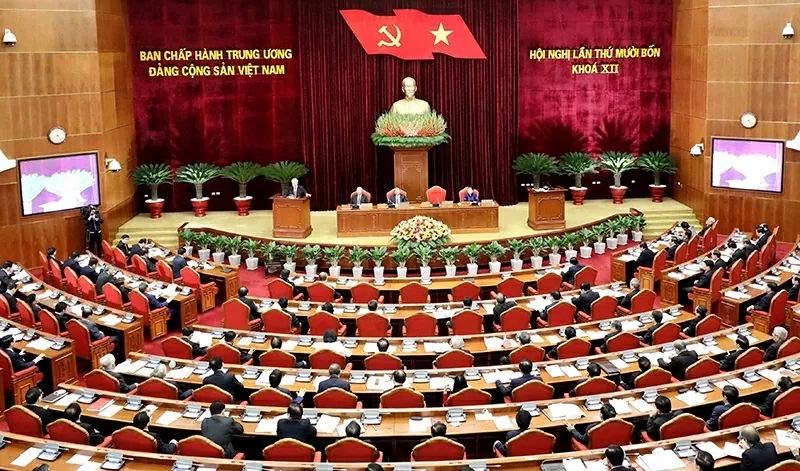 |
| Panorama of the Central Conference – where the Politburo discussed, gave opinions and issued important resolutions to guide the country's development in the new period. (Internet source) |
In the development flow of the country, the four resolutions recently issued by the Politburo have clearly defined the institutional pillars for the new period. Resolution 57-NQ/TW (December 22, 2024) opens the door to a breakthrough in science, technology, innovation and national digital transformation, aiming to turn knowledge and technology into a driving force for productivity growth, competitiveness enhancement and the creation of a new growth model. Next, Resolution 59-NQ/TW (January 24, 2025) expands Vietnam's development space in the international arena, with the spirit of proactive, comprehensive, in-depth and substantive integration, towards high standards on environment, labor, intellectual property and data security, thereby enhancing the country's position.
Along with the integration regime is Resolution 66-NQ/TW (April 30, 2025) - a strong response to the need for innovation in law-making and enforcement. This Resolution emphasizes a transparent, feasible, and disciplined legal system from the stage of regulation to enforcement, overcoming the lag between laws, decrees, and circulars, taking implementation effectiveness as a measure of policy. And for those institutions to become the vitality of the economy, Resolution 68-NQ/TW (May 4, 2025) has identified the private economy as one of the important driving forces of the socialist-oriented market economy, stimulating the spirit of entrepreneurship, technological innovation, raising governance standards, and participating more deeply in the global value chain.
The four resolutions create a harmonious connection between key areas: science – technology & digital transformation – international integration – law – private economy. These are the “four pillars” of institutions, contributing to building a solid foundation for Vietnam to enter a new era of development. This combination is both logical and reflects the Party’s strategic vision: to develop the country synchronously, comprehensively, and sustainably, on a modern institutional basis.
The Party's strategic thinking - the General Secretary's call
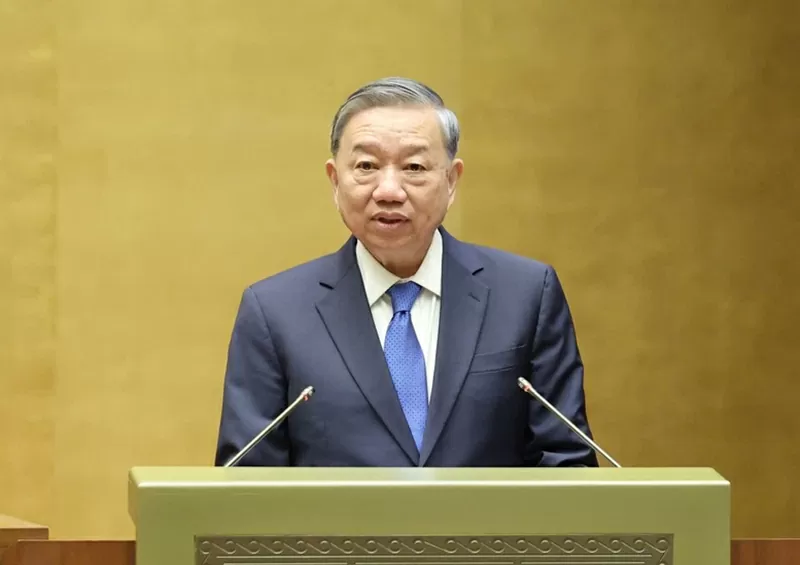 |
| General Secretary To Lam delivered a speech to disseminate the spirit of the Politburo's resolutions in Hanoi to disseminate and implement Resolution 68-NQ/TW of the Politburo on private economic development. (Source: Internet) |
Speaking at the National Conference to disseminate and implement the new resolutions of the Politburo in early 2025, General Secretary To Lam emphasized the need to transform development aspirations into concrete actions, considering the four resolutions as strategic orientations to create comprehensive institutional changes. The General Secretary affirmed that the four resolutions – on science, technology and innovation (57-NQ/TW), international integration (59-NQ/TW), innovation in law-making and enforcement (66-NQ/TW) and private economic development (68-NQ/TW) – are fundamental strategic orientations, creating a comprehensive shift for the country's development institutions.
According to the General Secretary, the synchronization between technology and innovation dynamics, integration space, solid legal corridors and a dynamic private sector will form a combined strength, helping Vietnam proactively adapt to the context of deep globalization, fierce competition and rapid transformation of the digital age.
The leadership of the Party leader clearly demonstrates high-level political determination, aiming to promote both internal strength and external strength, bringing the country to rapid and sustainable development, reaching new heights in the era of integration and innovation.
Strategic stature in turning points
The Politburo issued and implemented the “four resolutions” – 57-NQ/TW, 59-NQ/TW, 66-NQ/TW, 68-NQ/TW – which have great strategic value, not only in the scope of specific adjustments in each field but also in the scope of creating an institutional foundation for national development in the new period. First of all, this is an important step to synchronize the institutional system, supplement and perfect the core pillars: science - technology, law, economy and international integration. That synchronization creates a combined strength, helping Vietnam to meet the requirements of rapid and sustainable development while maintaining stability and social cohesion.
In the context of increasingly fierce global competition, the “Quad Resolutions” not only help Vietnam avoid being passive in the face of international fluctuations but also pave the way for proactively taking advantage of opportunities from the wave of shifting capital flows, technology and supply chains. A transparent legal system, a strong driving force of science, technology and innovation, a dynamic private economic sector, and deep international integration will be the “shield” and also the “lever” for the country to stand firm and make a breakthrough.
More importantly, the resolutions have strongly aroused the aspiration for strong development, strengthening the people's belief in the renewal policy and the Party's leadership. With that comprehensive institutional foundation, our nation has a solid foundation to realize the goal of becoming a developed, high-income country by 2045. The changing world poses many challenges, but it is the "four pillars" that have shaped the strategic vision, giving the entire political system and the entire nation the tools to steadily move forward, turning the aspiration for strength into reality.
| References - Resolution 57-NQ/TW dated December 22, 2024 on breakthroughs in science and technology development, innovation and national digital transformation. - Resolution 59-NQ/TW dated January 24, 2025 on international integration in the new situation. - Resolution 66-NQ/TW of 2025 on innovation in law making and enforcement to meet the requirements of national development. - Resolution 68-NQ/TW of 2025 on private economic development. |
***
Part 2: Aspiration into action – Together we create the future
Immediately after the Politburo issued the "four resolutions" - 57-NQ/TW on breakthroughs in science and technology development, innovation and national digital transformation, 59-NQ/TW on international integration in the new situation, 66-NQ/TW on innovation in law-making and enforcement, and 68-NQ/TW on private economic development - a spirit of action has spread strongly throughout the entire political system. In the parliament, the National Assembly urgently concretized them into laws; in the Government, a series of new management mechanisms and policies were issued; from provinces and cities to each facility, practical action programs were quickly born. The spirit of "turning aspirations into action" as General Secretary To Lam called for, is no longer a slogan but has become a widespread political movement, permeating every decision, every action, every step of development of the country.
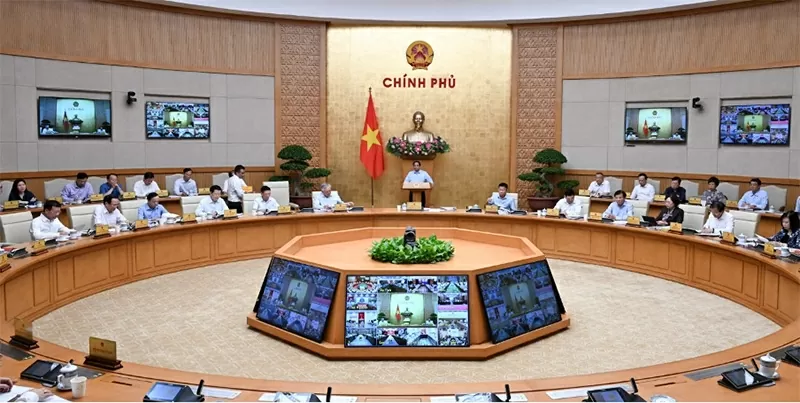 |
| Regular Government meeting. (Source: Government Electronic Information Portal) |
From resolution to law: a strong shift from “will” to “enforcement capacity”
In the "quartet", Resolution 66-NQ/TW (April 30, 2025) is considered the "institutional framework", resetting the standards for the entire legislative - executive - judicial process. Immediately after the resolution was issued, the National Assembly adjusted the Law and Ordinance Development Program for the 2021-2026 term, adding many key law projects to remove legal "bottlenecks". By mid-2025, key guiding decrees of the Land Law (amended) had been issued, creating a legal basis for localities to implement planning, land allocation - lease, auctions, etc. The new point is not only in the "speed of legislation" but also in the "discipline of implementation". The Government proactively issued guiding decrees and circulars early to avoid "lags" between documents and actual implementation. The Government Office emphasized the requirement to “build a feasible, public, transparent legal system, with people and businesses at the center” – in the spirit of Resolution 66.
Government action: businesses and people are at the center
If Resolution 66 lays the institutional foundation, Resolution 68-NQ/TW (May 4, 2025) adds direct impetus to the private economic sector - identified as one of the main driving forces of the socialist-oriented market economy. Implementing the resolution, the Government has deployed a Project to support small and medium-sized enterprises until 2030, focusing on three pillars: expanding access to credit, promoting innovation and improving governance capacity. The State Bank has directed credit institutions to expand large-scale preferential loan packages for start-ups, high-tech enterprises and enterprises participating in the global supply chain.
Along with capital comes knowledge and management: The Ministry of Planning and Investment, in coordination with VCCI, organized hundreds of training and consulting courses for private enterprises. According to the Vietnam Enterprise Report 2024, the number of enterprises participating in support programs increased significantly compared to 2022, reflecting the initial effectiveness of the resolution in practice.
By the end of 2024, 100% of online public services of groups I and II will be provided on the National Public Service Portal; The rate of online file processing will increase sharply; many business conditions will be reduced; e-invoices will be available nationwide, helping businesses significantly reduce compliance costs. Institutional reform associated with digital transformation is forming a "service ecosystem" where procedures are faster, costs are lower, and trust in the administrative apparatus is strengthened.
Science – technology and digital transformation: the foundation of sustainable development
Resolution 57-NQ/TW (December 22, 2024) identifies science, technology, innovation and national digital transformation as one of three strategic breakthroughs. After the resolution was issued, the Government and ministries and branches urgently implemented key documents such as the Strategy for Science, Technology and Innovation Development to 2030, the National High-Tech Development Program to 2030 and the National Digital Transformation Program to 2025, with a vision to 2030.
According to the Ministry of Information and Communications, the proportion of the digital economy in 2023 is about 16.5% of GDP; the target is ~20% in 2025 - more than double that of 2020. Ministries, branches and localities have issued plans for digital transformation, development of shared data infrastructure, formation of digital government, digital economy and digital society.
At the same time, Vietnam promotes policies to support the innovation ecosystem: the National Innovation Center (NIC), the National Technology Innovation Fund (NATIF), and high-tech zones (Hoa Lac, Ho Chi Minh City, Da Nang) have completed their operating mechanisms, strongly attracting high-tech projects. This is the step to concretize the spirit of "taking science and technology as the foundation, innovation as the driving force, and digital transformation as the development method".
Proactive integration: expanding development space and new standards
Resolution 59-NQ/TW (January 24, 2025) of the Politburo affirms the vision of comprehensive, proactive, in-depth and substantive integration, in line with the multi-layered, multi-sectoral trend of the new era. Vietnam has signed and implemented many new-generation FTAs (CPTPP, EVFTA, RCEP, etc.). The Vietnam-UAE CEPA has been signed (October 2024); the Vietnam-Israel VIFTA has been signed (2023) and is in the process of completing procedures according to regulations, expanding the market and creating new development space for Vietnamese enterprises.
On the institutional level, the Government continues to optimize the effectiveness of existing FTAs and promote new cooperation channels. In particular, the Vietnam-UAE Comprehensive Economic Partnership Agreement (CEPA) was signed on October 28, 2024, the Vietnam-Israel Free Trade Agreement (VIFTA) will take effect from 2024; at the same time, Vietnam is strengthening dialogue with the Mercosur bloc to study the possibility of building a bilateral trade framework.
At the corporate level, new requirements on transparent governance, environmental standards, labor, intellectual property and data security are being promoted, helping Vietnamese goods better meet high standards in the EU, US and Japanese markets.
At the same time, Vietnam is actively participating in integration in the digital field and green transformation: ASEAN is negotiating the Digital Economy Framework Agreement (DEFA) expected to be completed in 2025, and within the international framework, Vietnam has announced the JETP Resource Mobilization Plan to promote a fair energy transition.
Local involvement: creative, flexible, and practical
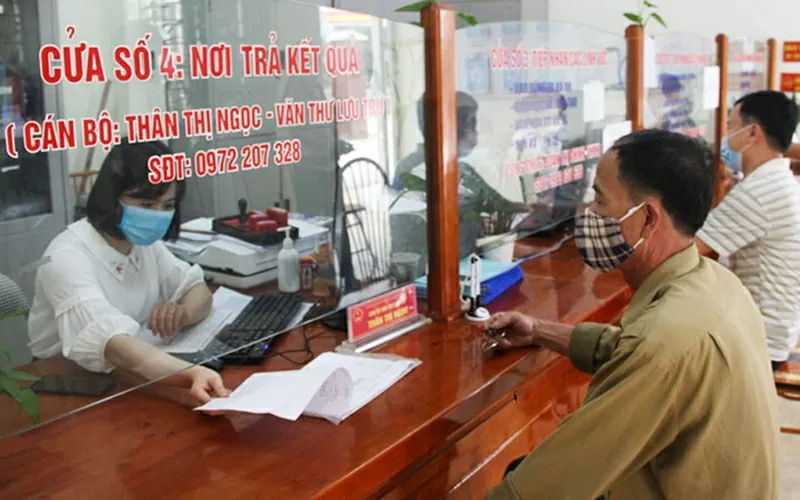 |
| Hanoi shortens investment licensing time thanks to the digital one-stop shop model (Source: Internet). |
From the central to local levels, the reform spirit is promoted in the direction of digitalization and "one-stop shop, one-stop shop": Hanoi implements a digital one-stop shop, requiring 100% of records to be digitized in 2024; Ho Chi Minh City maintains business dialogue, receives and responds to thousands of petitions; Quang Ninh promotes the "Business Cafe" model to remove procedures; Bac Giang supports lychee consumption through promotion, digital platforms and livestream; Dong Thap strengthens support for farmers to improve product quality. These initiatives show that the resolution can only truly "live" when it is acted upon creatively and decisively at the grassroots level.
Front and organizations: spreading resolutions into social movements
Resolutions only have vitality when they are supported by the community. The Central Committee of the Vietnam Fatherland Front regularly receives resources from organizations and individuals to support social security programs. Trade unions, youth unions, farmers' associations, etc. promote activities to improve skills, connect markets, promote entrepreneurship and digital transformation among young workers and rural areas; many programs and campaigns are regularly deployed at local and industry levels.
Initial results: data speaks, confidence is strengthened
Institutional reforms, digital transformation and business support policies have produced clear results. According to the Ministry of Planning and Investment, in the first 8 months of 2025, the country had about 128,200 newly registered enterprises, an increase of more than 15% over the same period in 2024, showing the confidence and resilience of the production and business sector in the context of many fluctuations in the world economy. The private economic sector continues to play an important role in the economy, contributing greatly to GDP growth, budget revenue and job creation for society, affirming its role as one of the main driving forces of the socialist-oriented market economy.
In terms of national governance, the 2024 PAPI index recorded that Quang Ninh continued to hold the leading position in the country with 47.82 points, reflecting a clear improvement in transparency, accountability and efficiency in serving the people.
The PCI 2024 Index also shows that the investment and business environment is increasingly improving, with Quang Ninh, Bac Giang, Long An, Hanoi and Ho Chi Minh City among the leading groups in the country in terms of provincial competitiveness, demonstrating the real effectiveness of institutional reform and digital transformation efforts.
At the national level, Vietnam maintained stable export momentum to major FTA markets; exports of software services, design and digital content continued to increase, demonstrating the resonance between the spirit of Resolution 57-NQ/TW (on science - technology, innovation, digital transformation) and Resolution 59-NQ/TW (on international integration).
Challenges behind the growth momentum
Initial successes do not obscure the need for deeper innovation. At the institutional level, some documents guiding the implementation of laws are slow to be issued, creating legal gaps; enforcement discipline in some places is uneven. In the business sector, 97% of enterprises are small and micro, with limited capacity for governance, technological innovation, and data standardization; the cost of green transformation and compliance with international standards is high. In the science and technology pillar, the rate of enterprises with innovation activities is only about 15-20%, R&D resources and high-quality human resources are lacking; the startup ecosystem is still scattered. In the integration process, the rate of domestic value added in processing and manufacturing is still below 30%, showing the need to continue improving design, R&D and chain management capacity.
These challenges are not permanent weaknesses, but the positive side of the rapid transformation process. It is important to maintain enforcement discipline, synchronize credit-technology-market policies, and stick to the goal of improving growth quality instead of chasing quantity.
From aspiration to action, from parliament to grassroots, the spirit of innovation has spread throughout the political system, permeating every policy and decision. The telling figures are just the tip of a deeper movement – the movement of belief, will and creative capacity. The road ahead is full of challenges, but the spirit of “united effort to create the future” is becoming a solid foundation for Vietnam to continue its journey of sustainable, modern and self-reliant development.
| References Law Library: Full text of Resolutions 57, 59, 66, 68. Government Portal; Bidding Newspaper; Ministry of Planning and Investment; Ministry of Information and Communications; General Statistics Office. Annual Business Report 2024; PAPI 2024; PCI 2024. World Bank (June 2024), IMF (July 2024). |
***
Part 3: BIDV Party Committee - Creative actions, driving force for development
When the "quadruple resolutions" 57-NQ/TW, 59-NQ/TW, 66-NQ/TW and 68-NQ/TW were issued by the Politburo, the institutional framework for the country's new development stage was clearly established: taking science - technology and digital transformation as the driving force, international integration as the space, the law as the corridor and the private economy as the engine of growth. That spirit has spread strongly throughout the entire political system and been transformed into concrete actions at many levels and in many sectors. In the state-owned enterprise sector, the Party Committee of the Joint Stock Commercial Bank for Investment and Development of Vietnam (BIDV) is a typical pioneer in institutionalizing resolutions, turning the Party's major policies into practical actions.
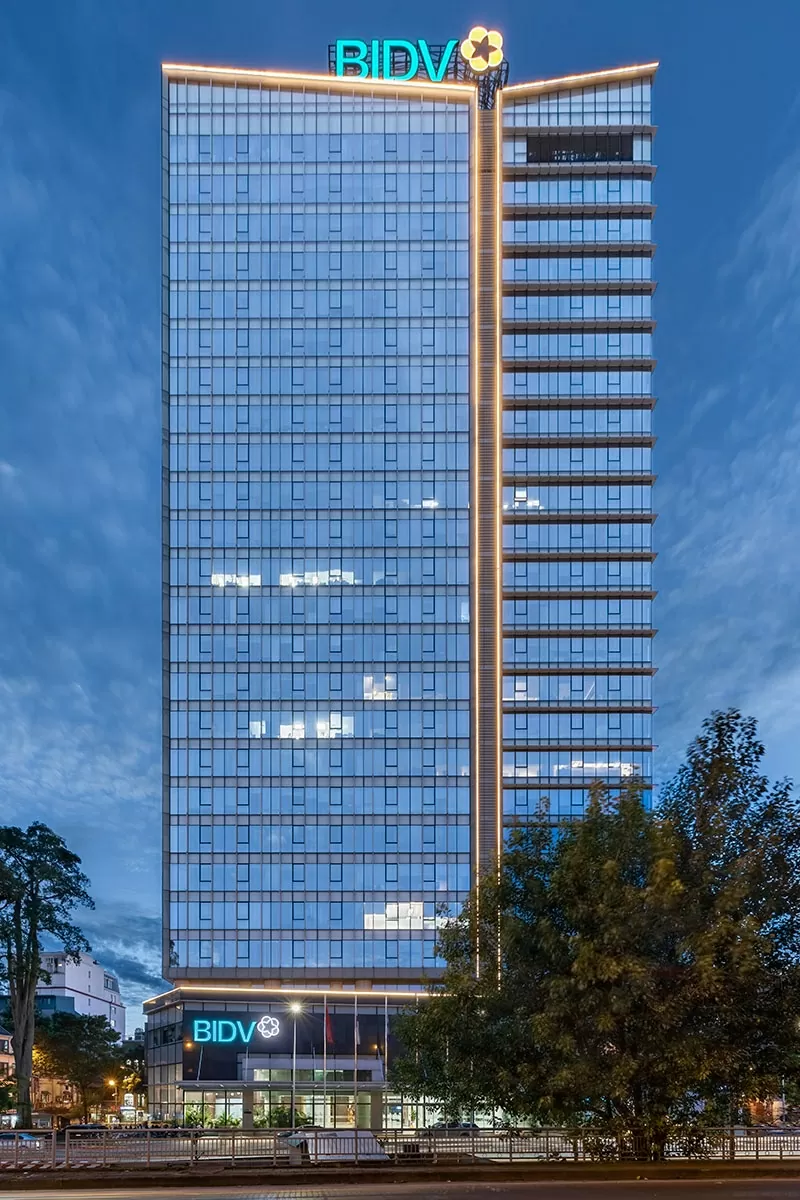 |
| BIDV Headquarters – Symbol of innovation and development aspirations |
From parliament to practice – institutionalizing resolutions
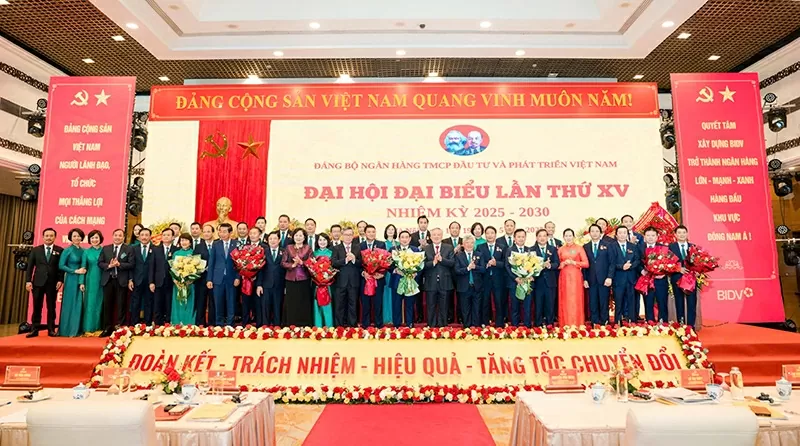 |
| Introducing the Executive Committee of the 15th Congress of the Party Committee of the Joint Stock Commercial Bank for Investment and Development of Vietnam for the 2025-2030 term. |
The 15th BIDV Party Congress (May 18-19, 2025) marked an important turning point: the bank officially became a Party Committee directly under the Government Party Committee, gathering more than 12,000 Party members in 245 grassroots Party organizations. The Congress set out the motto of action "Solidarity - Responsibility - Efficiency - Accelerating transformation", identifying the institutionalization of the Central Resolution as a key task throughout the term.
Immediately after the Congress, BIDV Party Committee quickly turned the spirit of the resolution into concrete actions. In just four months, four thematic resolutions were issued (11-NQ/DU, 13-NQ/DU, 21-NQ/DU, 22-NQ/DU), focusing on perfecting the organization, restructuring the network and innovating the management method according to the "5-ization" model - centralization, data, expertise, simplicity, automation. This approach demonstrates the proactive concretization of the spirit of Resolution 66-NQ/TW of the Politburo on innovation in law-making and enforcement, which emphasizes transparency, discipline and effective implementation. BIDV Party Committee operates according to a three-layer leadership model: Party Committee orientation - Executive Board concretization - units implementation and supervision, ensuring close connection between political tasks and business goals.
BIDV Party Committee launched Campaign A80 - "BIDV For a Radiant Vietnam" as a propaganda - mass mobilization movement that deeply connects political tasks and business activities. This is not only a brand communication activity but also an action program with profound ideology: each Party cell and each unit is assigned specific emulation targets associated with achievements in welcoming the 15th BIDV Party Congress, in which propaganda, business emulation, digital transformation and social security are deployed synchronously. Campaign A80 not only arouses a vibrant competitive spirit but also contributes to transforming propaganda - mass mobilization work into concrete action strength, creating a positive political atmosphere in the whole system. Thereby, the image of "BIDV Party member" becomes a symbol of pioneering spirit, dedication and contribution.
Perfecting internal institutions – realizing the spirit of Resolution 66-NQ/TW
Implementing Resolution 66-NQ/TW (April 30, 2025) on innovation in law making and enforcement, BIDV Party Committee identified perfecting internal institutions, standardizing processes and increasing enforcement discipline as the foundation of governance. This spirit is clearly shown in the orientation of the 15th BIDV Party Congress when "perfecting institutions, doing business based on technology platforms; accelerating model transformation; streamlining - efficiency - effectiveness" was listed as one of the three breakthroughs of the new term. Along with that, BIDV publicly disclosed information on accelerating digital transformation and innovating operating models, thereby improving transparency, compliance and operational efficiency of the entire system. These steps are in line with the spirit of Resolution 66: internal laws/adjustments must be synchronous, feasible, taking enforcement effectiveness as a measure, tightening discipline from the promulgation stage to implementation organization.
These innovations clearly demonstrate the spirit of Resolution 66-NQ/TW: building synchronous and feasible laws; taking enforcement effectiveness as a measure; tightening discipline from the stage of making regulations to organizing implementation. For BIDV, this is not only a management requirement but also a commitment to maintaining legal discipline, improving competitiveness and developing safely and sustainably.
Digital transformation – a breakthrough in implementing Resolution 57-NQ/TW
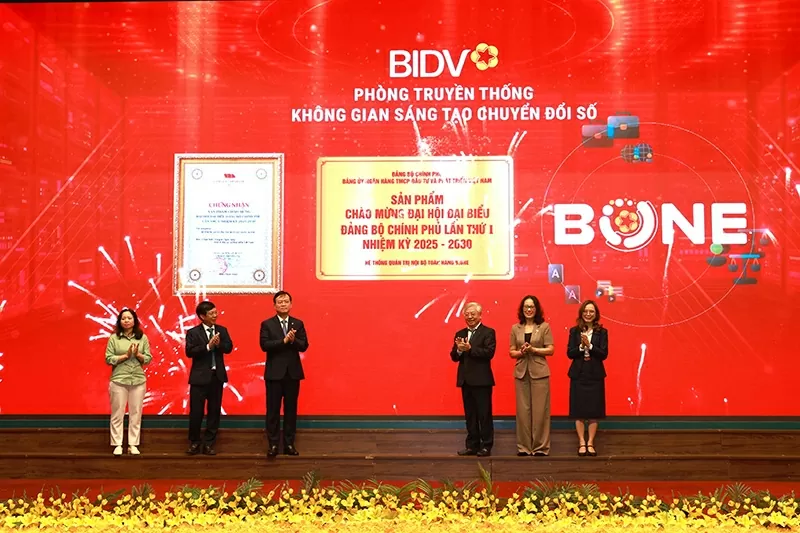 |
| BIDV Party Committee was recognized by the Government Party Committee for the B.One Digital Management System as a project to welcome the 1st Government Party Congress - a milestone for BIDV as a pioneer in digital transformation of Party work. |
Resolution 57-NQ/TW (December 22, 2024) identifies science, technology, innovation and digital transformation as strategic breakthroughs, as methods to increase productivity, increase competitiveness and modernize governance. Following that trend, BIDV Party Committee turns the spirit of the resolution into concrete actions, with responsible people, progress milestones and measurable effectiveness.
The Party Committee issued Resolution 09-DU/NQ dated July 30, 2025 on "Digital transformation of Party work in the period 2025-2028". The period 2025-2026 focuses on standardizing processes, unifying the platform for party member management, digitizing all records and data, building a centralized data warehouse; the period 2027-2028 expands the application of AI, big data analysis in consulting, synthesizing, inspecting, supervising, and evaluating cadres. The overarching goal: building an electronic, transparent, and effective BIDV Party Committee.
On that basis, in 2025, BIDV will put into operation the B.One digital management system with six functional spaces (B.Work, B.Legal, B.Services, B.Media, B.Wiki, B.Me), connecting more than 28,000 cadres, party members and employees. B.One aims to digitize key processes of Party work such as party member management, inspection - supervision, voting, reporting; forming the model of "digital party cell - digital party member - digital party committee". The system was recognized by the Government Party Committee as a "Typical product" to welcome the 1st Government Party Congress, term 2025-2030 (Decision 353-QD/DU dated September 9, 2025). On October 10, 2025, BIDV organized the "Typical product" sign for B.One; The system has processed nearly 1 million jobs, over 350,000 documents, helping to save about 30% of processing time and reduce operating costs.
Along with the digital transformation of Party work, propaganda work is "digitalized" synchronously: specialized landing pages, electronic newsletters, infographics, video clips, online exchange sessions serving the study of resolutions, helping Party members "easily access - easy to remember - easy to implement". Digital capacity building work is deployed on a system scale: from September 8-12, 2025, the Party Committee organizes a training conference on AI application for cadres of Party committees and Party agencies, combining direct - online to hundreds of connection points, ensuring 100% of cadres and Party members can attend.
Digital transformation is also extended to the social service space. In 2025, BIDV and the Hanoi City Public Administration Service Center signed a cooperation agreement for the period 2025-2030, implementing the "online public service agent" model: The two sides signed a cooperation agreement (2025-2030) to implement the "online public service agent" model at BIDV transaction points in the area to guide people and businesses to access, pay fees and perform procedures on the digital platform, contributing to accompanying the city in administrative reform and implementing the digital transformation goal.
From policy to action, BIDV's operating axis is consistent: The Party leads by resolutions and processes; technology (typically B.One) creates transparent, real-time infrastructure; digital propaganda and AI training foster digital culture. Digital transformation is therefore not just a new technology, but has become a working style and a driving force to increase the effectiveness of implementing Resolution 57-NQ/TW throughout the system.
Green development – deep integration, broad responsibility
Implementing the spirit of Resolution 68-NQ/TW of the Politburo on private economic development and Resolution 59-NQ/TW on international integration, BIDV Party Committee identified green and sustainable development as a strategic pillar in the bank's growth orientation. Specific programs and projects are implemented synchronously, linking digital transformation with green transformation, ensuring economic growth goes hand in hand with environmental protection.
According to the 2024 Sustainable Development Report and information published on the BIDV Information Portal in September 2025, by March 31, 2025, BIDV's green credit balance reached VND 78,605 billion, accounting for about 3.8% of total credit balance, spread over about 2,132 projects/plans. The bank has prioritized funding for areas such as renewable energy, clean production and green transportation.
BIDV is recognized as the first bank in Vietnam to issue green bonds according to ICMA's Green Bond Principles. The Bank has officially issued the "Sustainable Bond Framework" and "Green Bond Framework", ensuring compliance with the four pillars of capital and project management according to international standards. At the same time, BIDV has expanded cooperation with international organizations and deployed green and sustainable financial products, emphasizing capital mobilization from international channels and strengthening environmental and social risk management.
These results affirm the determination of BIDV Party Committee in realizing the Party's sustainable development policy, making the bank a pioneering green financial driving force in the state-owned enterprise system.
Keeping tradition alive – building trust
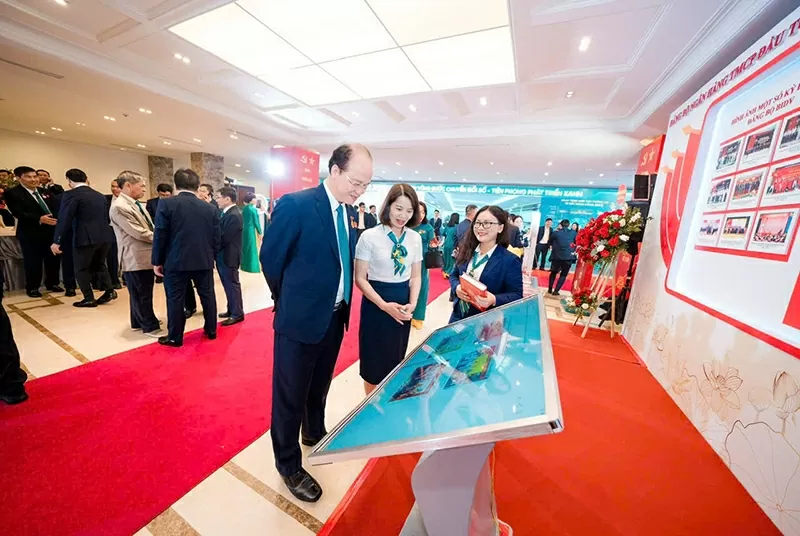 |
| BIDV officials and party members learn about "BIDV Party History 1957-2025" on a digital platform - spreading traditional values, arousing pride and the will to innovate. |
Over more than six decades of formation and development, every step of BIDV is imbued with the spirit of "serving the Fatherland - serving the people". From the early days of national construction to the period of innovation and integration, generations of BIDV cadres and party members have always kept their faith, courage and aspiration to contribute - to make the bank strong.
That tradition is crystallized in the publication “History of BIDV Party Committee 1957–2025”, published by the Truth National Political Publishing House, which is a meticulous scientific work, systematizing nearly 70 years of construction and growth of the Party Committee. The publication is digitized on BIDV's internal platform, helping tens of thousands of cadres and party members easily look up, study, spread pride, foster the will to innovate and a sense of responsibility to the bank and the Fatherland.
BIDV has pioneered a series of social security and community development programs. The bank announced the implementation of nearly 200 social security sponsorship programs in 2024 with a total budget of about VND 330 billion. At the same time, in the period of 2017-2022, the bank committed to sponsoring with a total budget of nearly VND 1,500 billion for activities such as education, health care and housing for the poor. Typical programs such as "BIDV - 1 million trees for Vietnam", "Community Cultural House to avoid flooding in the Central region" and a series of sponsorship activities for schools, health stations, and Great Unity houses across the country have become hallmarks of BIDV's social security work.
Resolutions come into life - driving force for sustainable development
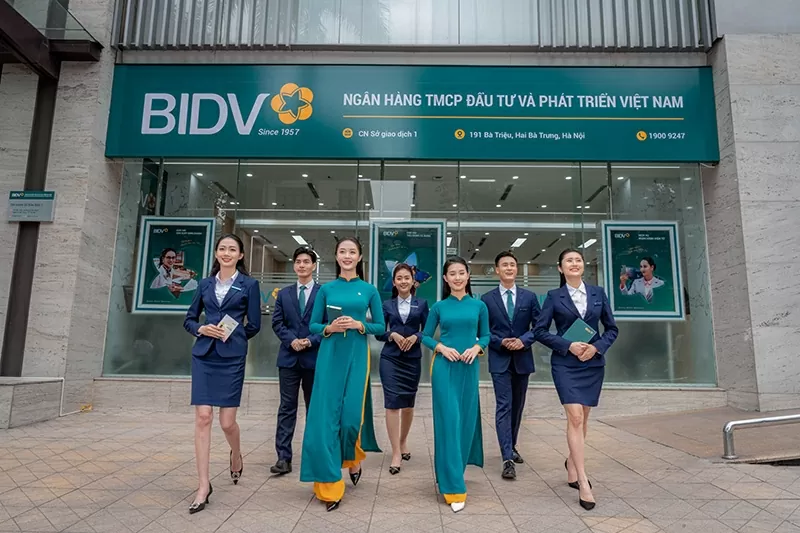 |
| Spirit of resolution in every step |
According to BIDV's consolidated financial report for the first 6 months of 2025 (published on BIDV Information Portal), total consolidated assets reached about VND 2.99 million billion, consolidated pre-tax profit reached VND 16,038 billion. Outstanding credit balance reached about VND 2.14 million billion, continuing to affirm its position as the largest bank in the system.
Along with business results, Party building and corporate culture development have recorded clear changes: grassroots party organizations have fulfilled their tasks well, inspection and supervision work has been strengthened, and the team of cadres and party members are increasingly more attached and responsible to the common development goals.
BIDV's efforts in innovation and sustainable development have helped it continuously be recognized domestically and internationally. According to BIDV Portal and prestigious financial magazines, in 2025, the bank was voted by The Asian Banker as "Best Retail Bank in Vietnam" for the 10th consecutive time, and also received the award for "Best Custodian - Supervisory Bank in Vietnam" by Asian Banker. Previously, Asiamoney also honored BIDV as "Vietnam's Leading Digital Solutions Bank" for pioneering the development of a comprehensive digital banking ecosystem. BIDV was also in the Top 10 ESG implementing banks in 2025 as voted by the Vietnam ESG Forum, affirming its orientation towards green, sustainable and socially responsible development. Domestically, BIDV has been in the Top 50 best listed enterprises in Vietnam for many consecutive years as voted by Forbes Vietnam, honored by the State Capital Management Committee as a leading enterprise in digital transformation and green credit, and rewarded by the State Bank of Vietnam for its contribution to the national financial inclusion program.
These recognitions not only reflect business results, but also vivid evidence of a BIDV that innovates – develops green – transforms digitally – integrates internationally, and realizes the spirit of the Central Resolutions. The spirit of “turning resolutions into action” has become BIDV’s typical political culture – a disciplined, transparent, efficient and responsible working style.
From the Central Resolution to the thematic resolution of BIDV Party Committee, the unity between thinking and action has been maintained, creating new momentum for the country's leading state-owned banking system. And from those steadfast steps, the journey of four major resolutions - 57-NQ/TW, 59-NQ/TW, 66-NQ/TW, 68-NQ/TW - has been transformed by BIDV into a real driving force for development, contributing with the whole Party and people to create the aspiration of a strong and prosperous Vietnam by 2045.
| References Resolutions 57-NQ/TW dated December 22, 2024, 59-NQ/TW dated January 24, 2025, 66-NQ/TW dated April 30, 2025, 68-NQ/TW dated May 4, 2025. Decision 353-QD/DU dated September 9, 2025 of the Government Party Committee. BIDV Information Portal; Government Newspaper; Nhan Dan Newspaper; VNA (September 3, 2025). |
Source: https://baoquocte.vn/nghi-quyet-lon-hanh-dong-manh-viet-nam-kien-tao-suc-bat-moi-332832.html




![[Photo] Da Nang: Water gradually recedes, local authorities take advantage of the cleanup](https://vphoto.vietnam.vn/thumb/1200x675/vietnam/resource/IMAGE/2025/10/31/1761897188943_ndo_tr_2-jpg.webp)


![[Photo] Prime Minister Pham Minh Chinh attends the 5th National Press Awards Ceremony on preventing and combating corruption, waste and negativity](https://vphoto.vietnam.vn/thumb/1200x675/vietnam/resource/IMAGE/2025/10/31/1761881588160_dsc-8359-jpg.webp)
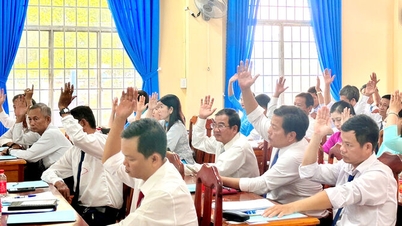



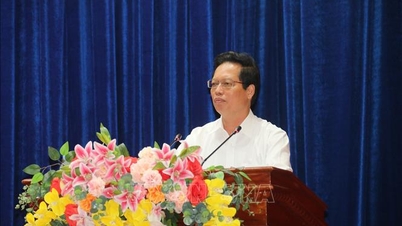

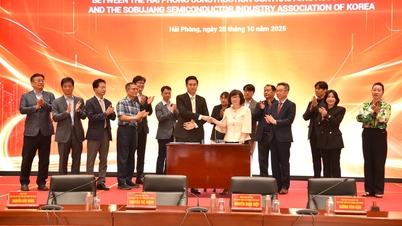

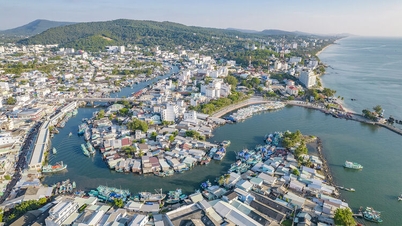
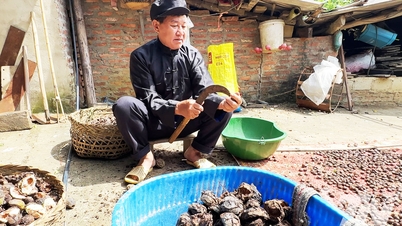

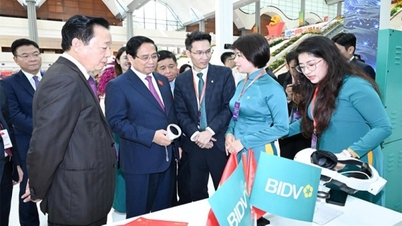
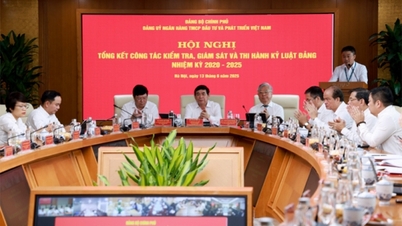

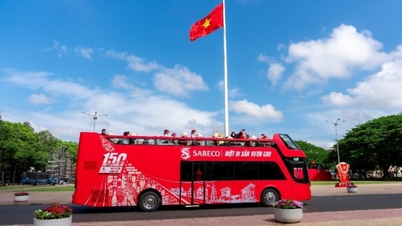

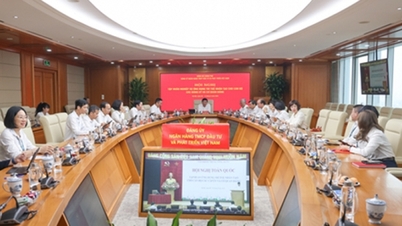




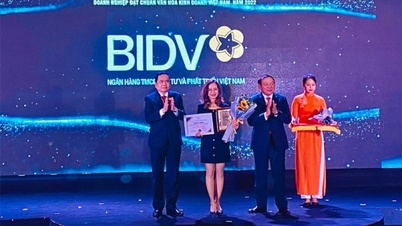
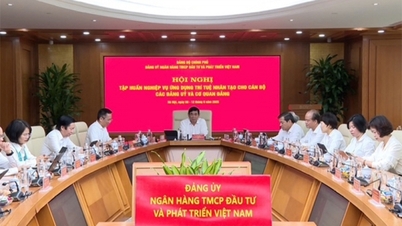
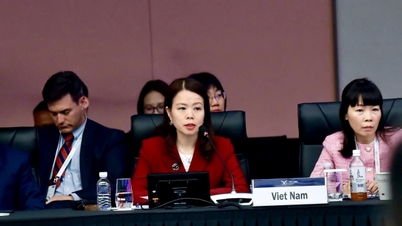
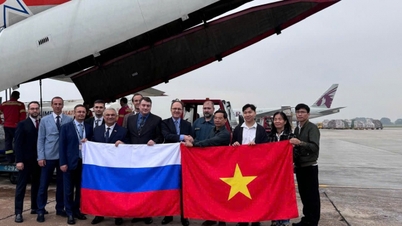
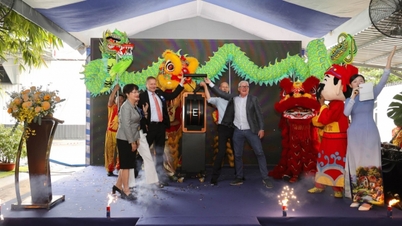
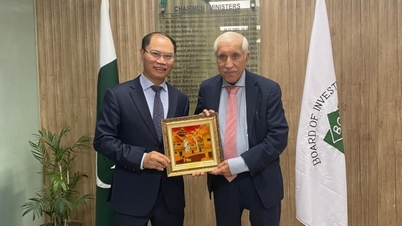




































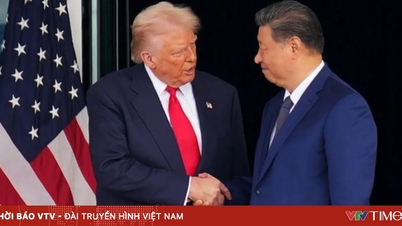

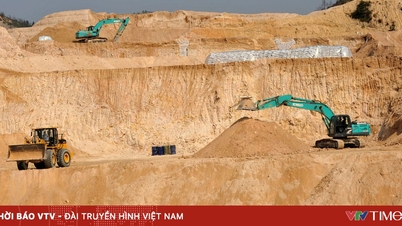
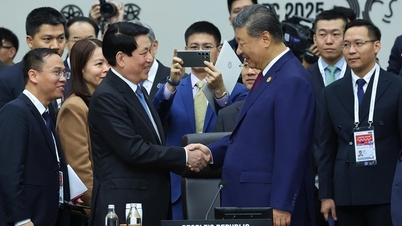
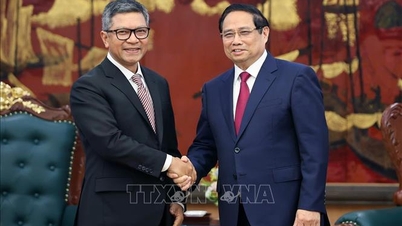
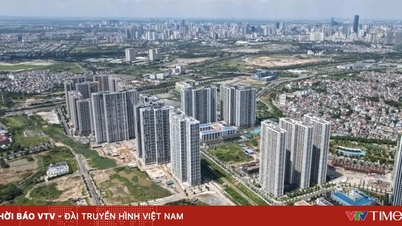





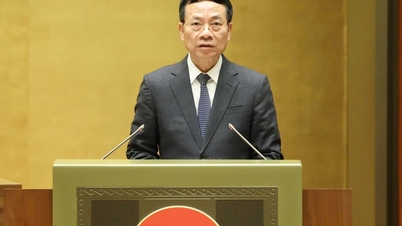

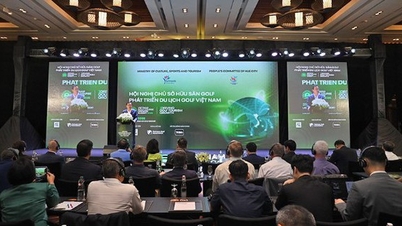

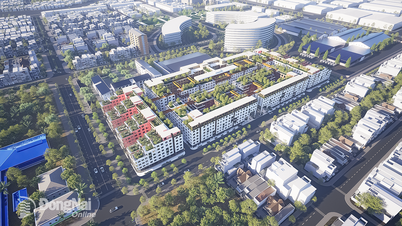


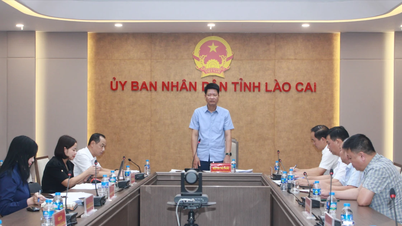

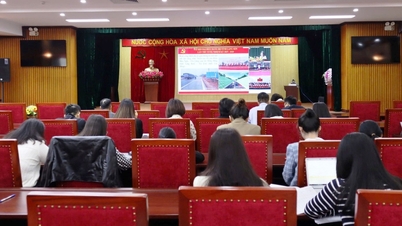

















Comment (0)